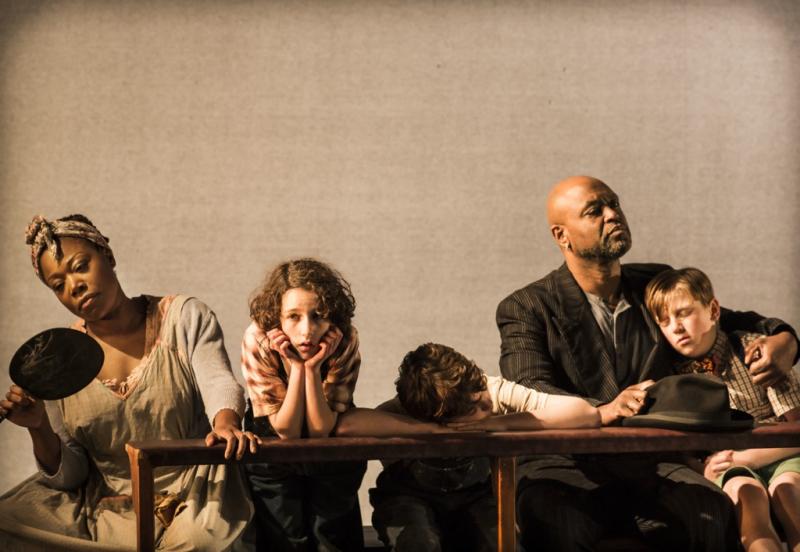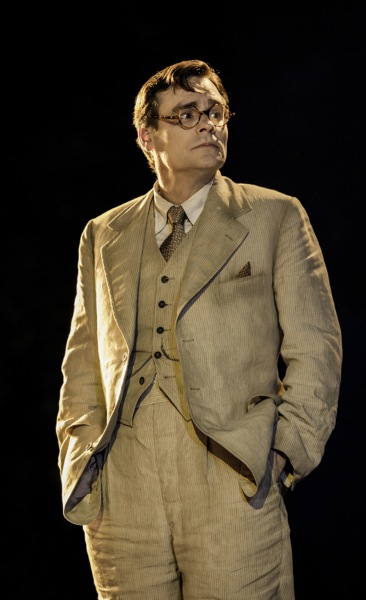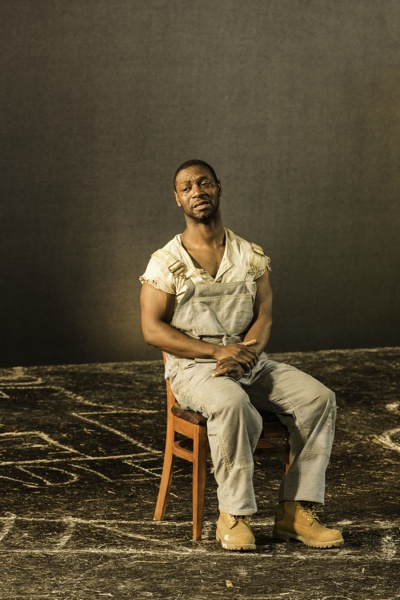To Kill A Mockingbird, Regent’s Park Open Air Theatre | reviews, news & interviews
To Kill A Mockingbird, Regent’s Park Open Air Theatre
To Kill A Mockingbird, Regent’s Park Open Air Theatre
London ain't Alabama, but Harper Lee's attack on racial intolerance still resonates

Every May the townspeople of Monroeville, Alabama, the home of Harper Lee, perform Christopher Sergel’s theatrical adaptation of Lee’s acclaimed, much beloved novel, on the grounds of the county courthouse. It’s a potent, somehow ironic demonstration of the enduring regard for the novel, in the very part of America whose racial intolerance Lee exposed.
It’s one thing performing, and seeing this story of the Deep South in its steamy locale, where even the shade is “sweltering” and “men’s stiff collars wilted by nine in the morning”, another outdoors in a still painfully chilly London May. But it’s testament to Timothy Sheader’s production that for long moments we are agreeably wrapped in the story’s magical embrace.
 The play starts with a surprise. First one actress steps up in the midst of the audience and starts reading, literally, from a copy of the book. We assume this will be the narrator; but then another takes over, then an actor, and before we know it the six-year-old Jean Louise Finch, aka Scout, is multi-form amongst us.
The play starts with a surprise. First one actress steps up in the midst of the audience and starts reading, literally, from a copy of the book. We assume this will be the narrator; but then another takes over, then an actor, and before we know it the six-year-old Jean Louise Finch, aka Scout, is multi-form amongst us.
While Sergel sensibly retained Scout’s distinctive voice by utilising an on-stage narrator, Sheader’s masterstroke is to share the task around his cast, all but four (the lead, and the children) dropping away from their characters to pick up a text and read to the audience. The move is not only theatrically dynamic, but somehow underlines the sense of ownership that anyone who has read the book feels for it.
The breathless excitement of the opening continues as the actors head for the stage – bare except for a tree – and start describing in chalk the Finch home and its immediate environs in the fictional town of Maycomb. Musician Phil King, who will regularly emerge with his guitar and harmonica, breaks into a song. And 1930s Alabama, bar the heat, is in place.
We are speedily, efficiently introduced to the chief characters. The tale centres on the Finches – Scout and her older brother Jem, their middle-aged, widowed father Atticus (Robert Sean Leonard, pictured above right) their black housekeeper Calpurnia and their friend Dill. The children’s mix of fascination and fear for the recluse Boo Radley informs many of their summer pranks; meanwhile Atticus prepares for the defence of Tom Robinson (Richie Campbell, pictured below), a black worker who has been falsely accused of rape yet whose guilty verdict is a foregone conclusion.
 If at times we miss a true sense of locale (the accents seem middling amongst the adults, are understandably casual in the children), Lee’s themes are powerfully felt: the corrosive depiction of racism offset by her call for tolerance and empathy, the children’s treatment and changing perception of Boo Radley reflecting the bigger challenges faced by their father. It’s also perhaps the most affecting account of good parenting ever written. The scene here in which Atticus faces the angry mob intent on lynching Tom is appropriately chilling, his overwhelmed reaction to his children’s support in that moment – which effectively saves his life – and the moral he imparts as a result incredibly moving.
If at times we miss a true sense of locale (the accents seem middling amongst the adults, are understandably casual in the children), Lee’s themes are powerfully felt: the corrosive depiction of racism offset by her call for tolerance and empathy, the children’s treatment and changing perception of Boo Radley reflecting the bigger challenges faced by their father. It’s also perhaps the most affecting account of good parenting ever written. The scene here in which Atticus faces the angry mob intent on lynching Tom is appropriately chilling, his overwhelmed reaction to his children’s support in that moment – which effectively saves his life – and the moral he imparts as a result incredibly moving.
Much rests on the children. Making her professional debut, Izzy Lee captures Scout’s scamp-like quality (though perhaps overdoes the wistfulness), Adam Scotland Jem’s charming intention to grow up fast, Harry Bennett Dill’s desperate desire for a family. They’re an engaging bunch. But I was a little less convinced by the star in town – and the only American in the cast – Robert Sean Leonard.
While it would be unjust to evoke Gregory Peck’s performance in the flawless film adaptation, this does fall short of what I regard as Leonard’s potential for the role. The actor captures the character’s moral fibre, his paternal fondness, but somehow misses the inner strength. His courtroom summation is faltering, the bowed gait and melancholy air at times underwhelming.
The ensemble is very effective, but special mention has to go to Simon Gregor’s villain of the piece, Bob Ewell, and Richie Campbell’s Robinson, whose courtroom speech captures the desperation of a man whose only crime is to feel sorry for a white girl.
rating
Explore topics
Share this article
The future of Arts Journalism
You can stop theartsdesk.com closing!
We urgently need financing to survive. Our fundraising drive has thus far raised £49,000 but we need to reach £100,000 or we will be forced to close. Please contribute here: https://gofund.me/c3f6033d
And if you can forward this information to anyone who might assist, we’d be grateful.

Subscribe to theartsdesk.com
Thank you for continuing to read our work on theartsdesk.com. For unlimited access to every article in its entirety, including our archive of more than 15,000 pieces, we're asking for £5 per month or £40 per year. We feel it's a very good deal, and hope you do too.
To take a subscription now simply click here.
And if you're looking for that extra gift for a friend or family member, why not treat them to a theartsdesk.com gift subscription?
more Theatre
 The Line of Beauty, Almeida Theatre review - the 80s revisited in theatrically ravishing form
Alan Hollinghurst novel is cunningly filleted, very finely acted
The Line of Beauty, Almeida Theatre review - the 80s revisited in theatrically ravishing form
Alan Hollinghurst novel is cunningly filleted, very finely acted
 Wendy & Peter Pan, Barbican Theatre review - mixed bag of panto and comic play, turned up to 11
The RSC adaptation is aimed at children, though all will thrill to its spectacle
Wendy & Peter Pan, Barbican Theatre review - mixed bag of panto and comic play, turned up to 11
The RSC adaptation is aimed at children, though all will thrill to its spectacle
 Hedda, Orange Tree Theatre review - a monument reimagined, perhaps even improved
Scandinavian masterpiece transplanted into a London reeling from the ravages of war
Hedda, Orange Tree Theatre review - a monument reimagined, perhaps even improved
Scandinavian masterpiece transplanted into a London reeling from the ravages of war
 The Assembled Parties, Hampstead review - a rarity, a well-made play delivered straight
Witty but poignant tribute to the strength of family ties as all around disintegrates
The Assembled Parties, Hampstead review - a rarity, a well-made play delivered straight
Witty but poignant tribute to the strength of family ties as all around disintegrates
 Mary Page Marlowe, Old Vic review - a starry portrait of a splintered life
Tracy Letts's Off Broadway play makes a shimmeringly powerful London debut
Mary Page Marlowe, Old Vic review - a starry portrait of a splintered life
Tracy Letts's Off Broadway play makes a shimmeringly powerful London debut
 Little Brother, Soho Theatre review - light, bright but emotionally true
This Verity Bargate Award-winning dramedy is entertaining as well as thought provoking
Little Brother, Soho Theatre review - light, bright but emotionally true
This Verity Bargate Award-winning dramedy is entertaining as well as thought provoking
 The Unbelievers, Royal Court Theatre - grimly compelling, powerfully performed
Nick Payne's new play is amongst his best
The Unbelievers, Royal Court Theatre - grimly compelling, powerfully performed
Nick Payne's new play is amongst his best
 The Maids, Donmar Warehouse review - vibrant cast lost in a spectacular-looking fever dream
Kip Williams revises Genet, with little gained in the update except eye-popping visuals
The Maids, Donmar Warehouse review - vibrant cast lost in a spectacular-looking fever dream
Kip Williams revises Genet, with little gained in the update except eye-popping visuals
 Ragdoll, Jermyn Street Theatre review - compelling and emotionally truthful
Katherine Moar returns with a Patty Hearst-inspired follow up to her debut hit 'Farm Hall'
Ragdoll, Jermyn Street Theatre review - compelling and emotionally truthful
Katherine Moar returns with a Patty Hearst-inspired follow up to her debut hit 'Farm Hall'
 Troilus and Cressida, Globe Theatre review - a 'problem play' with added problems
Raucous and carnivalesque, but also ugly and incomprehensible
Troilus and Cressida, Globe Theatre review - a 'problem play' with added problems
Raucous and carnivalesque, but also ugly and incomprehensible
 Clarkston, Trafalgar Theatre review - two lads on a road to nowhere
Netflix star, Joe Locke, is the selling point of a production that needs one
Clarkston, Trafalgar Theatre review - two lads on a road to nowhere
Netflix star, Joe Locke, is the selling point of a production that needs one
 Ghost Stories, Peacock Theatre review - spirited staging but short on scares
Impressive spectacle saves an ageing show in an unsuitable venue
Ghost Stories, Peacock Theatre review - spirited staging but short on scares
Impressive spectacle saves an ageing show in an unsuitable venue

Add comment